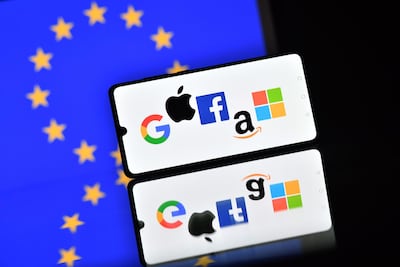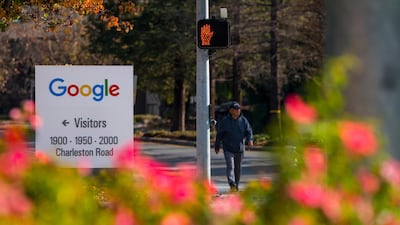It has been quite an extraordinary year for big tech. Giants of the technology sector cannily leveraged the expanding economic opportunities thrown up by the pandemic. But now they find themselves in the crosshairs of regulatory authorities in Europe, America, the UK and China. Will 2020 come to be seen as an inflection point, when traffic lights are finally erected on the digital highway, along with speed bumps, mandatory lay-bys and enforced idling zones? Perhaps.
Around the world, unease about so-called “surveillance capitalism” is throwing up common themes on tech regulation. Mostly, these appear to demand accountability and docility from digital companies, which one senior European official recently described as having grown “too big to care”.
Accordingly, regulators have been busy the past month and it has been pretty brutal for tech companies. In mid-December, the European Commission published drafts of two ambitious pieces of legislation that would force big tech companies to take more responsibility for policing content and to refrain from anticompetitive practices. Transgressors would face heavy fines and the threat of being broken up. Amazon, for instance, might have to pay nearly $30 billion.
Britain followed suit on the same day with proposed laws to fine Facebook, Twitter and TikTok up to 10 per cent of global revenue if they fail to remove and limit the spread of illegal content.
The week before Europe and Britain took aim at digital companies, the US Federal Trade Commission accused Facebook of unfair competition and asked a federal court to break it up. And just days ago, prosecutors in 38 US states and territories accused Google of illegally arranging its search results to push out smaller rivals. This was also the month China levied fines on its own tech leaders Alibaba and Tencent over antitrust violations.
The whole point of regulating big tech is to reassert ownership of knowledge
All of this shades a picture – which began to be sketched years ago – of profound governmental mistrust and the alleged malpractice by tech giants. The warning shots were arguably fired back in October, when the US Congress published a lengthy report on how to update competition law and the US Department of Justice subsequently launched a lawsuit against Google over alleged abuses of its monopoly in search advertising. In theory then, Europe’s proposed Digital Services Act (DSA) and Digital Markets Act (DMA), are not starting a new debate. They are simply turning up the volume on a long-running one.
Quite so. Consider the reception afforded to Harvard Business School professor emeritus Shoshana Zuboff's 2019 book The Age of Surveillance Capitalism. It explained her premise that tech companies were unilaterally claiming private human experience as raw material for data, which would be computed and "packaged as prediction products". Ms Zuboff's formulation hit a nerve. At the very least, it chimed with the overwrought emotions of people who reported being "swamped with Google and Facebook ads for beds and bedding" right after they purchased a bedroom bundle – a mattress, bed base, pillows and sheets. In the past few years, the netizen has increasingly described the feeling of being hunted down by companies like Facebook and Google that provide free online services. It is not surprising then that governments are paying attention.
Europe’s plans will take years of debate before they become law. But as our networked world goes into its third decade and now that more than half the planet’s population is online, it is worth thinking about what the proposed digital rules might mean.
What do regulators and netizens want to achieve by corralling big tech? And what can tech companies do differently to stay in business while staying in touch with the zeitgeist?
These questions have particular resonance during the coronavirus crisis, when educational institutions have been relying on Google services to teach students during lockdown. In the circumstances, a closure – even partial – of the digital highway may not be a good idea.
By all accounts, that is not on the cards anyway. Instead, regulators across the US, UK and EU are agreed on the need for more digital champions – many small, nimble companies – not just a few big beasts in the tech jungle. Europe’s proposed DMA would ban tech companies from preferential treatment of their own products on their platforms and impose a greater obligation for large firms to share data with smaller companies and to ensure interoperability with their own software and hardware.
European Commission vice president Margrethe Vestager, who presides over the bloc's digital policies, has likened the new proposals to the "first-ever traffic light that brought order in the (online) streets". That is an evocative image. In practice, the new order would mean new community habits and new ways of sharing. Search engines such as Google would need to provide their ranking, query, click and view data to rival search engines such as Qwant, a French firm. In a sense, tech regulation would land squarely along the financial sector, in order to curb abusive monopoly behaviour.
In Dave Eggers' 2013 novel The Circle, a giant eponymous California tech company bears a "do no evil" philosophy somewhat like Google in its early phase. But the fictional company's overall creed according to one of Egger's characters is "infocommunism", the belief that no one is entitled to privacy, "secrets are lies (and) and sharing is caring". This subverts the idea of a person's right to control dissemination of their data.
The whole point of regulating big tech is to reassert ownership of knowledge and data and limit licenses for its use.
There is much to be said for the effort.
Rashmee Roshan Lall is a columnist for The National
Our family matters legal consultant
Name: Dr Hassan Mohsen Elhais
Position: legal consultant with Al Rowaad Advocates and Legal Consultants.
Profile
Company name: Jaib
Started: January 2018
Co-founders: Fouad Jeryes and Sinan Taifour
Based: Jordan
Sector: FinTech
Total transactions: over $800,000 since January, 2018
Investors in Jaib's mother company Alpha Apps: Aramex and 500 Startups
Concrete and Gold
Foo Fighters
RCA records
Defence review at a glance
• Increase defence spending to 2.5% of GDP by 2027 but given “turbulent times it may be necessary to go faster”
• Prioritise a shift towards working with AI and autonomous systems
• Invest in the resilience of military space systems.
• Number of active reserves should be increased by 20%
• More F-35 fighter jets required in the next decade
• New “hybrid Navy” with AUKUS submarines and autonomous vessels
Quick%20facts
%3Cul%3E%0A%3Cli%3EStorstockholms%20Lokaltrafik%20(SL)%20offers%20free%20guided%20tours%20of%20art%20in%20the%20metro%20and%20at%20the%20stations%3C%2Fli%3E%0A%3Cli%3EThe%20tours%20are%20free%20of%20charge%3B%20all%20you%20need%20is%20a%20valid%20SL%20ticket%2C%20for%20which%20a%20single%20journey%20(valid%20for%2075%20minutes)%20costs%2039%20Swedish%20krone%20(%243.75)%3C%2Fli%3E%0A%3Cli%3ETravel%20cards%20for%20unlimited%20journeys%20are%20priced%20at%20165%20Swedish%20krone%20for%2024%20hours%3C%2Fli%3E%0A%3Cli%3EAvoid%20rush%20hour%20%E2%80%93%20between%209.30%20am%20and%204.30%20pm%20%E2%80%93%20to%20explore%20the%20artwork%20at%20leisure%3C%2Fli%3E%0A%3C%2Ful%3E%0A
Sole survivors
- Cecelia Crocker was on board Northwest Airlines Flight 255 in 1987 when it crashed in Detroit, killing 154 people, including her parents and brother. The plane had hit a light pole on take off
- George Lamson Jr, from Minnesota, was on a Galaxy Airlines flight that crashed in Reno in 1985, killing 68 people. His entire seat was launched out of the plane
- Bahia Bakari, then 12, survived when a Yemenia Airways flight crashed near the Comoros in 2009, killing 152. She was found clinging to wreckage after floating in the ocean for 13 hours.
- Jim Polehinke was the co-pilot and sole survivor of a 2006 Comair flight that crashed in Lexington, Kentucky, killing 49.
Profile
Company: Justmop.com
Date started: December 2015
Founders: Kerem Kuyucu and Cagatay Ozcan
Sector: Technology and home services
Based: Jumeirah Lake Towers, Dubai
Size: 55 employees and 100,000 cleaning requests a month
Funding: The company’s investors include Collective Spark, Faith Capital Holding, Oak Capital, VentureFriends, and 500 Startups.
Secret Pigeon Service: Operation Colomba, Resistance and the Struggle to Liberate Europe
Gordon Corera, Harper Collins
How to watch Ireland v Pakistan in UAE
When: The one-off Test starts on Friday, May 11
What time: Each day’s play is scheduled to start at 2pm UAE time.
TV: The match will be broadcast on OSN Sports Cricket HD. Subscribers to the channel can also stream the action live on OSN Play.
UK%20record%20temperature
%3Cp%3E38.7C%20(101.7F)%20set%20in%20Cambridge%20in%202019%3C%2Fp%3E%0A
Specs
Engine: Electric motor generating 54.2kWh (Cooper SE and Aceman SE), 64.6kW (Countryman All4 SE)
Power: 218hp (Cooper and Aceman), 313hp (Countryman)
Torque: 330Nm (Cooper and Aceman), 494Nm (Countryman)
On sale: Now
Price: From Dh158,000 (Cooper), Dh168,000 (Aceman), Dh190,000 (Countryman)
Director: Laxman Utekar
Cast: Vicky Kaushal, Akshaye Khanna, Diana Penty, Vineet Kumar Singh, Rashmika Mandanna
Rating: 1/5
RESULTS
%3Cp%3E%0D5pm%3A%20Al%20Maha%20Stables%20%E2%80%93%20Maiden%20(PA)%20Dh80%2C000%20(Turf)%201%2C400m%0D%3Cbr%3EWinner%3A%20AF%20Alfahem%2C%20Tadhg%20O%E2%80%99Shea%20(jockey)%2C%20Ernst%20Oetrel%20(trainer)%0D%3Cbr%3E5.30pm%3A%20Al%20Anoud%20Stables%20%E2%80%93%20Handicap%20(PA)%20Dh80%2C000%20(T)%201%2C200m%0D%3Cbr%3EWinner%3A%20AF%20Musannef%2C%20Tadhg%20O%E2%80%99Shea%2C%20Ernst%20Oertel%0D%3Cbr%3E6pm%3A%20Wathba%20Stallions%20Cup%20%E2%80%93%20Handicap%20(PA)%20Dh70%2C000%20(T)%201%2C400m%0D%3Cbr%3EWinner%3A%20AF%20Rasam%2C%20Tadhg%20O%E2%80%99Shea%2C%20Ernst%20Oertel%0D%3Cbr%3E6.30pm%3A%20Arabian%20Triple%20Crown%20Round%202%20%E2%80%93%20Group%203%20(PA)%20Dh%20300%2C000%20(T)%202%2C200m%0D%3Cbr%3EWinner%3A%20Joe%20Star%2C%20Tadhg%20O%E2%80%99Shea%2C%20Helal%20Al%20Alawi%0D%3Cbr%3E7pm%3A%20Liwa%20Oasis%20%E2%80%93%20Group%202%20(PA)%20Dh300%2C000%20(T)%201%2C400m%0D%3Cbr%3EWinner%3A%20AF%20Alajaj%2C%20Tadhg%20O%E2%80%99Shea%2C%20Ernst%20Oertel%0D%3Cbr%3E7.30pm%3A%20Dames%20Stables%20%E2%80%93%20Handicap%20(TB)%20Dh80%2C000%20(T)%201%2C400m%0D%3Cbr%3EWinner%3A%20Silent%20Defense%2C%20Oscar%20Chavez%2C%20Rashed%20Bouresly%3C%2Fp%3E%0A
Cricket World Cup League 2 Fixtures
Saturday March 5, UAE v Oman, ICC Academy (all matches start at 9.30am)
Sunday March 6, Oman v Namibia, ICC Academy
Tuesday March 8, UAE v Namibia, ICC Academy
Wednesday March 9, UAE v Oman, ICC Academy
Friday March 11, Oman v Namibia, Sharjah Cricket Stadium
Saturday March 12, UAE v Namibia, Sharjah Cricket Stadium
UAE squad
Ahmed Raza (captain), Chirag Suri, Muhammad Waseem, CP Rizwan, Vriitya Aravind, Asif Khan, Basil Hameed, Rohan Mustafa, Kashif Daud, Zahoor Khan, Junaid Siddique, Karthik Meiyappan, Akif Raja, Rahul Bhatia
Indoor cricket in a nutshell
Indoor Cricket World Cup – Sep 16-20, Insportz, Dubai
16 Indoor cricket matches are 16 overs per side
8 There are eight players per team
9 There have been nine Indoor Cricket World Cups for men. Australia have won every one.
5 Five runs are deducted from the score when a wickets falls
4 Batsmen bat in pairs, facing four overs per partnership
Scoring In indoor cricket, runs are scored by way of both physical and bonus runs. Physical runs are scored by both batsmen completing a run from one crease to the other. Bonus runs are scored when the ball hits a net in different zones, but only when at least one physical run is score.
Zones
A Front net, behind the striker and wicketkeeper: 0 runs
B Side nets, between the striker and halfway down the pitch: 1 run
C Side nets between halfway and the bowlers end: 2 runs
D Back net: 4 runs on the bounce, 6 runs on the full
FA%20Cup%20semi-final%20draw
%3Cp%3ECoventry%20City%20v%20Manchester%20United%C2%A0%3C%2Fp%3E%0A%3Cp%3EManchester%20City%20v%20Chelsea%3C%2Fp%3E%0A%3Cp%3E-%20Games%20to%20be%20played%20at%20Wembley%20Stadium%20on%20weekend%20of%20April%2020%2F21.%C2%A0%3C%2Fp%3E%0A
Scores
Oman 109-3 in 18.4 overs (Aqib Ilyas 45 not out, Aamir Kaleem 27) beat UAE 108-9 in 20 overs (Usman 27, Mustafa 24, Fayyaz 3-16, Bilal 3-23)
UAE currency: the story behind the money in your pockets
RESULTS
Bantamweight
Victor Nunes (BRA) beat Siyovush Gulmamadov (TJK)
(Split decision)
Featherweight
Hussein Salim (IRQ) beat Shakhriyor Juraev (UZB)
(Round 1 submission, armbar)
Catchweight 80kg
Rashed Dawood (UAE) beat Otabek Kadirov (UZB)
(Round-1 submission, rear naked choke)
Lightweight
Ho Taek-oh (KOR) beat Ronald Girones (CUB)
(Round 3 submission, triangle choke)
Lightweight
Arthur Zaynukov (RUS) beat Damien Lapilus (FRA)
(Unanimous points)
Bantamweight
Vinicius de Oliveira (BRA) beat Furkatbek Yokubov (RUS)
(Round 1 TKO)
Featherweight
Movlid Khaybulaev (RUS) v Zaka Fatullazade (AZE)
(Round 1 rear naked choke)
Flyweight
Shannon Ross (TUR) beat Donovon Freelow (USA)
(Unanimous decision)
Lightweight
Dan Collins (GBR) beat Mohammad Yahya (UAE)
(Round 2 submission D’arce choke)
Catchweight 73kg
Martun Mezhulmyan (ARM) beat Islam Mamedov (RUS)
(Round 3 submission, kneebar)
Bantamweight world title
Xavier Alaoui (MAR) beat Jaures Dea (CAM)
(Unanimous points 48-46, 49-45, 49-45)
Flyweight world title
Manon Fiorot (FRA) v Gabriela Campo (ARG)
(Round 1 RSC)
RESULTS
1.45pm: Maiden Dh75,000 1,400m
Winner: Dirilis Ertugrul, Fabrice Veron (jockey), Ismail Mohammed (trainer)
2.15pm: Handicap Dh90,000 1,400m
Winner: Kidd Malibu, Sandro Paiva, Musabah Al Muhairi
2.45pm: Maiden Dh75,000 1,000m
Winner: Raakezz, Tadhg O’Shea, Nicholas Bachalard
3.15pm: Handicap Dh105,000 1,200m
Winner: Au Couer, Sean Kirrane, Satish Seemar
3.45pm: Maiden Dh75,000 1,600m
Winner: Rayig, Pat Dobbs, Doug Watson
4.15pm: Handicap Dh105,000 1,600m
Winner: Chiefdom, Royston Ffrench, Salem bin Ghadayer
4.45pm: Handicap Dh80,000 1,800m
Winner: King’s Shadow, Richard Mullen, Satish Seemar
BORDERLANDS
Starring: Cate Blanchett, Kevin Hart, Jamie Lee Curtis
Director: Eli Roth
Rating: 0/5
England squad
Goalkeepers: Jordan Pickford, Nick Pope, Aaron Ramsdale
Defenders: Trent Alexander-Arnold, Conor Coady, Marc Guehi, Reece James, Harry Maguire, Tyrone Mings, Luke Shaw, John Stones, Ben White
Midfielders: Jude Bellingham, Conor Gallagher, Mason Mount, Jordan Henderson, Declan Rice, James Ward-Prowse
Forwards: Tammy Abraham, Phil Foden, Jack Grealish, Harry Kane, Bukayo Saka, Emile Smith Rowe, Raheem Sterling





